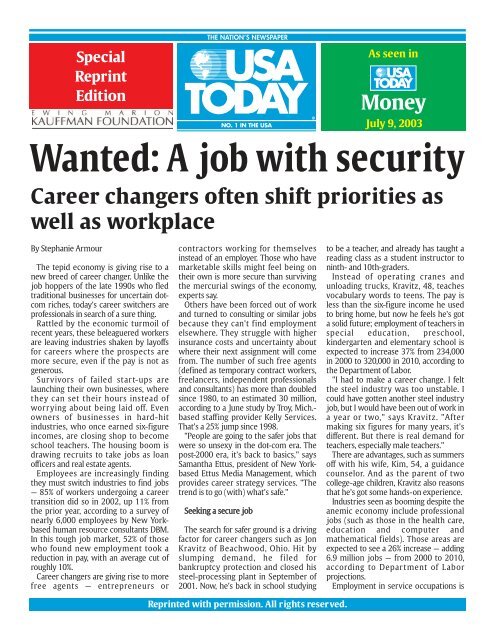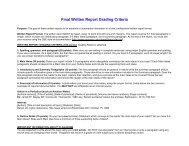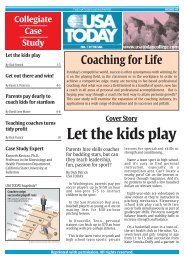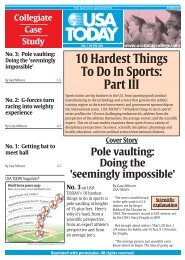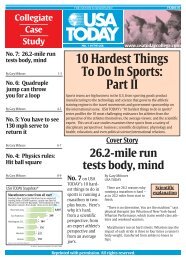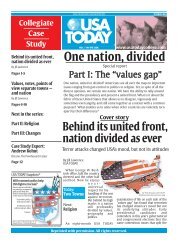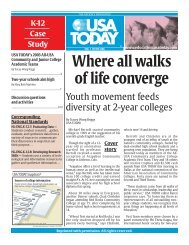A Job With Security - USA TODAY Education - K-12 Education Online
A Job With Security - USA TODAY Education - K-12 Education Online
A Job With Security - USA TODAY Education - K-12 Education Online
Create successful ePaper yourself
Turn your PDF publications into a flip-book with our unique Google optimized e-Paper software.
THE NATION’S NEWSPAPER<br />
Special<br />
Reprint<br />
Edition<br />
As seen in<br />
Money<br />
July 9, 2003<br />
Wanted: A job with security<br />
Career changers often shift priorities as<br />
well as workplace<br />
By Stephanie Armour<br />
The tepid economy is giving rise to a<br />
new breed of career changer. Unlike the<br />
job hoppers of the late 1990s who fled<br />
traditional businesses for uncertain dotcom<br />
riches, today's career switchers are<br />
professionals in search of a sure thing.<br />
Rattled by the economic turmoil of<br />
recent years, these beleaguered workers<br />
are leaving industries shaken by layoffs<br />
for careers where the prospects are<br />
more secure, even if the pay is not as<br />
generous.<br />
Survivors of failed start-ups are<br />
launching their own businesses, where<br />
they can set their hours instead of<br />
worrying about being laid off. Even<br />
owners of businesses in hard-hit<br />
industries, who once earned six-figure<br />
incomes, are closing shop to become<br />
school teachers. The housing boom is<br />
drawing recruits to take jobs as loan<br />
officers and real estate agents.<br />
Employees are increasingly finding<br />
they must switch industries to find jobs<br />
— 85% of workers undergoing a career<br />
transition did so in 2002, up 11% from<br />
the prior year, according to a survey of<br />
nearly 6,000 employees by New Yorkbased<br />
human resource consultants DBM.<br />
In this tough job market, 52% of those<br />
who found new employment took a<br />
reduction in pay, with an average cut of<br />
roughly 10%.<br />
Career changers are giving rise to more<br />
free agents — entrepreneurs or<br />
contractors working for themselves<br />
instead of an employer. Those who have<br />
marketable skills might feel being on<br />
their own is more secure than surviving<br />
the mercurial swings of the economy,<br />
experts say.<br />
Others have been forced out of work<br />
and turned to consulting or similar jobs<br />
because they can't find employment<br />
elsewhere. They struggle with higher<br />
insurance costs and uncertainty about<br />
where their next assignment will come<br />
from. The number of such free agents<br />
(defined as temporary contract workers,<br />
freelancers, independent professionals<br />
and consultants) has more than doubled<br />
since 1980, to an estimated 30 million,<br />
according to a June study by Troy, Mich.-<br />
based staffing provider Kelly Services.<br />
That's a 25% jump since 1998.<br />
"People are going to the safer jobs that<br />
were so unsexy in the dot-com era. The<br />
post-2000 era, it's back to basics," says<br />
Samantha Ettus, president of New Yorkbased<br />
Ettus Media Management, which<br />
provides career strategy services. "The<br />
trend is to go (with) what's safe."<br />
Seeking a secure job<br />
The search for safer ground is a driving<br />
factor for career changers such as Jon<br />
Kravitz of Beachwood, Ohio. Hit by<br />
slumping demand, he filed for<br />
bankruptcy protection and closed his<br />
steel-processing plant in September of<br />
2001. Now, he's back in school studying<br />
to be a teacher, and already has taught a<br />
reading class as a student instructor to<br />
ninth- and 10th-graders.<br />
Instead of operating cranes and<br />
unloading trucks, Kravitz, 48, teaches<br />
vocabulary words to teens. The pay is<br />
less than the six-figure income he used<br />
to bring home, but now he feels he's got<br />
a solid future; employment of teachers in<br />
special education, preschool,<br />
kindergarten and elementary school is<br />
expected to increase 37% from 234,000<br />
in 2000 to 320,000 in 2010, according to<br />
the Department of Labor.<br />
"I had to make a career change. I felt<br />
the steel industry was too unstable. I<br />
could have gotten another steel industry<br />
job, but I would have been out of work in<br />
a year or two," says Kravitz. "After<br />
making six figures for many years, it's<br />
different. But there is real demand for<br />
teachers, especially male teachers."<br />
There are advantages, such as summers<br />
off with his wife, Kim, 54, a guidance<br />
counselor. And as the parent of two<br />
college-age children, Kravitz also reasons<br />
that he's got some hands-on experience.<br />
Industries seen as booming despite the<br />
anemic economy include professional<br />
jobs (such as those in the health care,<br />
education and computer and<br />
mathematical fields). Those areas are<br />
expected to see a 26% increase — adding<br />
6.9 million jobs — from 2000 to 2010,<br />
according to Department of Labor<br />
projections.<br />
Employment in service occupations is<br />
Reprinted with permission. All rights reserved.
AS SEEN IN <strong>USA</strong> <strong>TODAY</strong>’S MONEY SECTION, JULY 9, 2003<br />
projected to increase by 5.1 million, or 19.5%. Health care<br />
support occupations are expected to grow 33.4%, adding 1.1<br />
million new jobs. Computer software engineers are expected<br />
to add 380,000 jobs by 2010, and medical assistants jobs<br />
should grow by 187,000. Registered nurses will add 561,000<br />
jobs, a 26% jump over 2000. Truck drivers, security guards,<br />
accountants and auditors all will be in demand.<br />
Occupations with the biggest decreases are in office and<br />
administrative support and jobs such as order clerks and<br />
tellers, which have been hit hard by increased automation.<br />
Meaningful work crucial<br />
For those in search of more secure jobs, here's what's in: jobs<br />
that allow more work/life balance; work that is meaningful and<br />
enjoyable; benefit coverage; good relationships with managers<br />
and co-workers; and trustworthy employers. What's out: <strong>Job</strong>s<br />
that deliver quick payoffs but no long-term security.<br />
"A lot of the guys we deal with, they took jobs in the late '90s<br />
for the dot-com payoff. When the economy got tough, most of<br />
them never had any energy or passion for it," says Bob<br />
Lambert in Irvine, Calif., managing partner at executive search<br />
firm Christian & Timbers. "The economy is forcing more people<br />
to face reality. It becomes the catalyst for change."<br />
Marshall Longtin, 33, of Green Lake, Wash., used to crave the<br />
high-tech payoff. For a decade, he worked in the tech industry,<br />
partly in management and telecom sales. Then the dot-com<br />
boom went bust.<br />
In March of 2002, he left his job, feeling he needed safer<br />
ground, and turned to real estate. Longtin bought some<br />
investment properties that he began refurbishing and renting,<br />
then decided to take a 60-hour training course to get a real<br />
estate license. He finished in April and has sold several homes<br />
as an agent for zipRealty.<br />
"I found what I should have been doing all along," Longtin<br />
says. "But the money in the tech sector was great, and I<br />
wouldn't have left it if it hadn't dried up. Now, I'd never<br />
go back."<br />
Risks of career switching<br />
Not everyone is so lucky. Some career counselors and<br />
executive recruiters say hopscotching can lead to "professional<br />
rebound," the career equivalent of dating rebound. Downsized<br />
employees are so worried about job insecurity, they leap to<br />
new industries they don't love. What they think is a safety net<br />
becomes a trap.<br />
Career counselors also say it's easy to underestimate the<br />
financial and personal costs of making a drastic move.<br />
Returning to school or training for a different profession can<br />
cost tens of thousands of dollars, plus a time commitment of<br />
months or years.<br />
Executives who once earned top dollars can find themselves<br />
at the bottom rung of the pay ladder, competing with younger<br />
workers who command smaller salaries but might not have the<br />
same debt loads or family responsibilities. Slightly less than half<br />
of career-transitioning employees got the same or higher pay in<br />
new jobs, the DBM study says. It can also be an ego blow,<br />
experts say, to be the new "kid," working for a boss who might<br />
be fresh out of school.<br />
"You can do it in the late 30s or early 40s, but if you wait<br />
much longer, you're perceived as too old," says David Theobald,<br />
CEO and co-founder of Netshare.com, an online job listing and<br />
career resource site for executives earning $100,000 and up.<br />
"For those earning $150,000 and up, it's much more difficult to<br />
make a career move. You're going to have to work very hard to<br />
make it happen."<br />
Returning to school or doing some sort of apprenticeship is<br />
frequently necessary, and career changes are one reason that<br />
universities and colleges are seeing an enrollment boom. The<br />
number of students age 35 and older in degree-granting<br />
institutions has soared from about 823,000 in 1970 to an<br />
estimated 2.9 million in 2001 — doubling from 9.6% of total<br />
students to 19.2%, according to the National Center for<br />
<strong>Education</strong> Statistics.<br />
For John Philbin, 38, an economy-driven career<br />
transformation has meant going back to school and sacrificing<br />
financially — at least for now. Philbin, of University Heights,<br />
Ohio, was laid off in September 2002 from his job in<br />
manufacturing sales. While he knew the business well, he was<br />
convinced there had to be a more secure career alternative<br />
that he would enjoy more. The father of two (Maggie, 5, and<br />
Jack, 4) is attending Notre Dame College in South Euclid, Ohio,<br />
studying to become a teacher in preschool through third grade.<br />
Every week, he passes up golf outings with friends to study<br />
topics such as the role of phonics in reading. He goes to the<br />
library to study instead of having extra time with his kids. It's a<br />
bit intimidating, Philbin says, because he was never a good<br />
student and wasn't sure what it would be like to be one of the<br />
oldest in the class.<br />
"I have 30 years left to work. Male teachers are pretty scarce<br />
in every grade, so that's a bonus for me. I'll be in demand,"<br />
Philbin says. "And I want to be a role model for my own<br />
children. I don't want them to see me work hard in a job I can't<br />
stand just to put food on the table."<br />
The investment of time and money in retraining can pay off.<br />
Sam DeBord, 26, was a tech consultant for<br />
PricewaterhouseCoopers until he lost his job in 2001. He did a<br />
few odd jobs, such as teaching Web design, before settling on a<br />
new career: working as a loan officer. Because of the<br />
refinancing craze, DeBord has never been busier or in more<br />
demand.<br />
"<strong>With</strong> the downturn in the economy, this is one area that's<br />
picking up," says DeBord of San Diego. "Business is crazy,<br />
mortgage companies are hiring as fast as they can. It's very<br />
secure."<br />
Reprinted with permission. All rights reserved.
AS SEEN IN <strong>USA</strong> <strong>TODAY</strong>’S MONEY SECTION, JULY 9, 2003<br />
Entrepreneurship rising<br />
Career changes driven by economic<br />
turmoil can also be a catalyst for<br />
entrepreneurship. The Small Business<br />
Administration's Office of Advocacy<br />
reports that the number of sole<br />
proprietorships climbed from 17.5<br />
million in 2000 to 18.3 million in 2002.<br />
While starting a business is a gamble in a<br />
lackluster economy, it can often seem<br />
like a more secure option to workers<br />
who believe they have marketable skills.<br />
It can also represent greater individual<br />
freedom and a chance to follow a<br />
career passion.<br />
"So many times, people take the jobs<br />
that fell into their lap, that had a lucrative<br />
(pay) package or were jobs their family<br />
thought they were supposed to take,"<br />
says Rebecca Zucker, who runs Next Step<br />
Partners, a San Francisco-based<br />
organization that focuses on career<br />
strategies. "They haven't had a chance to<br />
ask, 'What have I always wanted to do in<br />
my life' "<br />
Kevin Quaintance, 35, had the answer<br />
to that question. He wanted to launch<br />
a company.<br />
Quaintance moved to Silicon Valley<br />
from Los Angeles in 1999 to join the dotcom<br />
gold rush. But the riches never<br />
came. Instead, he joined a succession of<br />
start-ups that went belly-up. In August<br />
2002, he lost his job as director of<br />
operations when his Internet firm — his<br />
third employer since moving — ran out<br />
of funding.<br />
Unable to find another job, Quaintance<br />
decided to take control and in December<br />
2002 started his own wireless service<br />
company, Authdirect, which he runs<br />
As seen in Experience <strong>TODAY</strong><br />
from his garage. He now has 10<br />
customers and monthly income.<br />
Quaintance admits it's a risk, but he<br />
says that having more control by running<br />
his own company might actually be<br />
more of a sure thing than joining yet<br />
another floundering start-up.<br />
"This is my company, and I control the<br />
destiny. Before, I was one of the<br />
employees, and I didn't have any<br />
control," says Quaintance of San Jose,<br />
Calif. His son, Austin, is 8 months old.<br />
"And I can spend more time with Austin,<br />
I can help watch him during the day. If I<br />
was working 8 a.m. to 6 p.m., I'd miss out<br />
on that."<br />
Wanted: A job with<br />
security, 1-2B<br />
APPLICATIONS: careers, cause & effect, graphic organizer, analysis<br />
DISCUSSION: How do today’s job hoppers differ from the<br />
career switchers of the late 1990s Why are many workers<br />
changing industries What is a “free agent” What industries<br />
are booming despite the weak economy Which occupations<br />
are seeing the biggest decreases What types of<br />
perks have become crucial to employees What is “professional<br />
rebound” In your opinion, is it more important to<br />
have a job you enjoy or one that pays well<br />
ACTIVITY: Create a graphic organizer that lists the pros and<br />
cons of working for yourself and working for an employer.<br />
After, decide which you would prefer, and explain why in<br />
writing. Then, share the lists you generated and the choice<br />
you made with your parents. Ask for their feedback.<br />
By Eileen Blass, <strong>USA</strong> <strong>TODAY</strong><br />
Laid off, moving on: Camp counselor John Philbin,<br />
left, rides on a bus with campers Ben Giller, <strong>12</strong>, center,<br />
and Charlie Boeschenstein, <strong>12</strong>. Philbin was in<br />
manufacturing sales but is taking college classes to<br />
become a teacher.<br />
Reprinted with permission. All rights reserved.


